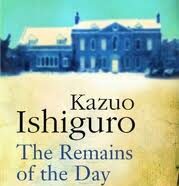Favourite Reads: “The Remains of the Day” by Kazuo Ishiguro
“But all in all, I can see no genuine reason why I should not undertake this trip.”
This novel is extraordinary for its narrative voice. It is Mr Stevens and it is 1956; he is due a few days off and is planning a very English-style holiday involving guest houses and suitable costumes as well as ensuring he’s presented appropriately given that he represents Darlington Hall.
The trip is a major affair and everthing has to be carefully considered. Even the offer by his employer Mr Faraday to allow the trip and to cover the cost of fuel is analysed in depth. We quickly learn that the trip is not so simple as it initially seemed: there’s a Mrs Kenton who now lives elsewhere due to marriage but is an erstwhile colleague of Stevens’. The latter suggests rehiring her as there is a paucity of good help at Darlington. Mr Faraday jokes with Stevens about his motives and Stevens is mortified. Stevens isn’t au fait with “banter”: indeed he seems very much ill-at-ease with it.
Most of the novel is told in retrospect. We see a forgotten (by some) world where duty is everything. This is very evident in the personage of Stevens’ father. Both men are English to the core. Living up to this standard is perhaps what ensures that he remains – for the duration of the story – uptight, quietly desperate and somehow vaguely attenuated.
Mr Stevens and his colleague Mr Graham disagree on the subject of dignity. The latter believes it to be an innate quality like a woman’s beauty, while Stevens believes it’s something that can be pursued and perfected over time. He opines that his father had this rare and essential dignity in the sense he wasn’t just a kind of performer with superficial talents. It was through a story told by his father that Stevens learned about the dignity of a butler. A butler discovers a tiger in the dining room. He calmly and in hushed tones informs his employer and asks for permission to shoot the intruder. The gentleman and his guests hear shots and the butler returns to reassure his master of the threat’s removal.
Another salutary tale is of a military man considered to have been responsible for Stevens’ uncle’s death in a botched military manoeuvre in the Boer War. The very same General came to stay in Stevens Snr’s place of work and had to be waited upon for several days, and by some accounts tolerated with no small amount of equanimity by the staff, including of course Mr Stevens. Yet he served the visitor so well that the General left a generous tip that was donated to charity. In a word, dignity cannot be defined easily, except by certain illustrative examples as alluded to above.
Stevens argues that English butlers are inherently better than any other since they are the only ones capable of behaving with dignity in the most challenging circumstances.
The novel is about the tension between one’s duty to one’s country and culture and their personal happiness. That tension is managed expertly by Ishiguro who has created a tragic figure in Mr Stevens and a portrait of a world now all but forgotten.
R.H.






